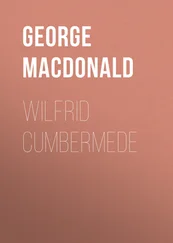George MacDonald - Warlock o' Glenwarlock - A Homely Romance
Здесь есть возможность читать онлайн «George MacDonald - Warlock o' Glenwarlock - A Homely Romance» — ознакомительный отрывок электронной книги совершенно бесплатно, а после прочтения отрывка купить полную версию. В некоторых случаях можно слушать аудио, скачать через торрент в формате fb2 и присутствует краткое содержание. Издательство: Иностранный паблик, Жанр: foreign_prose, foreign_religion, foreign_antique, на английском языке. Описание произведения, (предисловие) а так же отзывы посетителей доступны на портале библиотеки ЛибКат.
- Название:Warlock o' Glenwarlock: A Homely Romance
- Автор:
- Издательство:Иностранный паблик
- Жанр:
- Год:неизвестен
- ISBN:нет данных
- Рейтинг книги:3 / 5. Голосов: 1
-
Избранное:Добавить в избранное
- Отзывы:
-
Ваша оценка:
- 60
- 1
- 2
- 3
- 4
- 5
Warlock o' Glenwarlock: A Homely Romance: краткое содержание, описание и аннотация
Предлагаем к чтению аннотацию, описание, краткое содержание или предисловие (зависит от того, что написал сам автор книги «Warlock o' Glenwarlock: A Homely Romance»). Если вы не нашли необходимую информацию о книге — напишите в комментариях, мы постараемся отыскать её.
Warlock o' Glenwarlock: A Homely Romance — читать онлайн ознакомительный отрывок
Ниже представлен текст книги, разбитый по страницам. Система сохранения места последней прочитанной страницы, позволяет с удобством читать онлайн бесплатно книгу «Warlock o' Glenwarlock: A Homely Romance», без необходимости каждый раз заново искать на чём Вы остановились. Поставьте закладку, и сможете в любой момент перейти на страницу, на которой закончили чтение.
Интервал:
Закладка:
Again Cosmo burst into a great laugh, and this time Grizzie, seriously alarmed lest he should be in reality fey, grew angry, and seizing hold of him by the arm, pulled lustily.
"Get up, I tell ye!" she cried. "Here's the laird speirin' what's come o' ye,'at ye come na hame to yer tay."
But Cosmo instead of rising only laughed the more, and went on until at length Grizzie made use of a terrible threat.
"As sure's sowens!" she said, "gien ye dinna haud yer tongue wi' that menseless-like lauchin', I'll no tell ye anither auld-warld tale afore Marti'mas."
"Will ye tell me ane the nicht gien I haud my tongue an' gang hame wi' ye?"
"Ay, that wull I—that's gien I can min' upo' ane."
He rose at once, and laughed no more. They walked home together in the utmost peace.
After tea, his father went out with him for a stroll, and to call on Jeames Gracie, the owner of the cow whose inconstellation had so much amused him. He was an old man, with an elderly wife, and a grand-daughter—a weaver to trade, whose father and grandfather before him had for many a decade done the weaving work, both in linen and wool, required by "them at the castle." He had been on the land, in the person of his ancestors, from time almost immemorial, though he had only a small cottage, and a little bit of land, barely enough to feed the translunar cow. But poor little place as Jeames's was, if the laird would have sold it the price would have gone a good way towards clearing the rest of his property of its encumbrances. For the situation of the little spot was such as to make it specially desirable in the eyes of the next proprietor, on the border of whose land it lay. He was a lord of session, and had taken his title from the place, which he inherited from his father; who, although a laird, had been so little of a gentleman, that the lordship had not been enough to make one of his son. He was yet another of those trim, orderly men, who will sacrifice anything—not to beauty—of that they have in general no sense—but to tidiness: tidiness in law, in divinity, in morals, in estate, in garden, in house, in person—tidiness is in their eyes the first thing—seemingly because it is the highest creative energy of which they are capable. Naturally the dwelling of James Gracie was an eyesore to this man, being visible from not a few of his windows, and from almost anywhere on the private road to his house; for decidedly it was not tidy. Neither in truth was it dirty, while to any life—loving nature it was as pleasant to know, as it was picturesque to look at. But the very appearance of poverty seems to act as a reproach on some of the rich—at least why else are they so anxious to get it out of their sight?—and Lord Lickmyloof—that was not his real title, but he was better known by it than by the name of his land: it came of a nasty habit he had, which I need not at present indicate farther—Lord Lickmyloof could not bear the sight of the cottage which no painter would have consented to omit from the landscape. It haunted him like an evil thing.
CHAPTER V.
THE SCHOOL
The next morning, by the steep farm road, and the parish road, which ran along the border of the river and followed it downward, Cosmo, on his way to school, with his books in a green baize bag, hung by the strings over his shoulder, came out from among the hills upon a comparative plain. But there were hills on all sides round him yet—not very high—few of them more than a couple of thousand feet—but bleak and bare, even under the glow of the summer sun, for the time of heather was not yet, when they would show warm and rich to the eye of poet and painter. Most of the farmers there, however, would have felt a little insulted by being asked to admire them at any time: whatever their colour or shape or product, they were incapable of yielding crops and money! In truth many a man who now admires, would be unable to do so, if, like those farmers, he had to struggle with nature for little more than a bare living. The struggle there, what with early, long-lasting, and bitter winters, and the barrenness of the soil in many parts, was a severe one.
Leaving the river, the road ascended a little, and joined the highway, which kept along a level, consisting mostly of land lately redeemed from the peat-moss. It went straight for two miles, fenced from the fields in many parts by low stone walls without mortar, abhorrent to the eye of Cosmo; in other parts by walls of earth, called dykes, which delighted his very soul. These were covered with grass for the vagrant cow, sprinkled with loveliest little wild flowers for the poet-peasant, burrowed in by wild bees for the adventurous delight of the honey-drawn school-boy. Glad I am they had not quite vanished from Scotland before I was sent thither, but remained to help me get ready for the kingdom of heaven: those dykes must still be dear to my brothers who have gone up before me. Some of the fields had only a small ditch between them and the road, and some of them had no kind of fence at all. It was a dreary road even in summer, though not therefore without its loveable features—amongst which the dykes; and wherever there is anything to love, there is beauty in some form.
A short way past the second milestone, he came to the first straggling houses of the village. It was called Muir of Warlock, after the moor on which it stood, as the moor was called after the river that ran through it, and that named after the glen, which took its name from the family—so that the Warlocks had scattered their cognomen all around them. A somewhat dismal-looking village it was—except to those that knew its people: to some of such it was beautiful—as the plainest face is beautiful to him who knows a sweet soul inside it. The highway ran through it—a broad fine road, fit for the richest country under the sun; but the causeway along its edges, making of it for the space a street, was of the poorest and narrowest. Some of the cottages stood immediately upon the path, some of them receded a little. They were almost all of one story, built of stone, and rough-cast-harled, they called it there, with roofs of thick thatch, in which a half smothered pane of glass might hint at some sort of room beneath. As Cosmo walked along, he saw all the trades at work; from blacksmith to tailor, everybody was busy. Now and then he was met by a strong scent, as of burning leather, from the oak-bark which some of the housewives used for fuel, after its essence had been exhausted in the tan-pit, but mostly the air was filled with the odour of burning peat. Cosmo knew almost everybody, and was kindly greeted as he went along—none the less that some of them, hearing from their children that he had not been to school the day before, had remarked that his birthday hardly brought him enough to keep it with. The vulgarity belonging to the worship of Mammon, is by no means confined to the rich; many of these, having next to nothing, yet thought profession the one thing, money, houses, lands the only inheritances. It is a marvel that even world-loving people should never see with what a load they oppress the lives of the children to whom, instead of bringing them up to earn their own living, and thus enjoy at least THE GAME of life, they leave a fortune enough to sink a devil yet deeper in hell. Was it nothing to Cosmo to inherit a long line of ancestors whose story he knew—their virtues, their faults, their wickedness, their humiliation?—to inherit the nobility of a father such as his? the graciousness of a mother such as that father caused him to remember her? Was there no occasion for the laird to rejoice in the birth of a boy whom he believed to have inherited all the virtues of his race, and left all their vices behind? But none of the villagers forgot, however they might regard the holiday, that Cosmo was the "yoong laird" notwithstanding the poverty of his house; and they all knew that in old time the birthday of the heir had been a holiday to the school as well as to himself, and remembered the introduction of the change by the present master. Indeed, throughout the village, although there were not a few landed proprietors in the neighbourhood whose lands came nearer, all of whom of course were lairds, and although the village itself had ceased to belong to the family, Glenwarlock was always called the laird; and the better part in the hearts of even the money-loving and money-trusting among its inhabitants, honoured him as the best man in the country, "thof he hed sae little skeel at haudin' his ain nest thegither;" and though, besides, there is scarce a money-making man who does not believe poverty the cousin, if not the child of fault; and the more unscrupulous, within the law , a man has been in making his money, the more he regards the man who seems to have lost the race he has won, as somehow or other to blame: "People with naught are naughty." Nor is this judgment confined to the morally unscrupulous. Few who are themselves permitted to be successful, care to conjecture that it may be the will of the power, that in part through their affairs, rules men, that some should be, in that way, unsuccessful: better can be made of them by preventing the so-called success. Some men rise with the treatment under which others would sink. But of the inhabitants of Muir of Warlock, only a rather larger proportion than of the inhabitants of Mayfair would have taken interest in such a theory of results.
Читать дальшеИнтервал:
Закладка:
Похожие книги на «Warlock o' Glenwarlock: A Homely Romance»
Представляем Вашему вниманию похожие книги на «Warlock o' Glenwarlock: A Homely Romance» списком для выбора. Мы отобрали схожую по названию и смыслу литературу в надежде предоставить читателям больше вариантов отыскать новые, интересные, ещё непрочитанные произведения.
Обсуждение, отзывы о книге «Warlock o' Glenwarlock: A Homely Romance» и просто собственные мнения читателей. Оставьте ваши комментарии, напишите, что Вы думаете о произведении, его смысле или главных героях. Укажите что конкретно понравилось, а что нет, и почему Вы так считаете.












